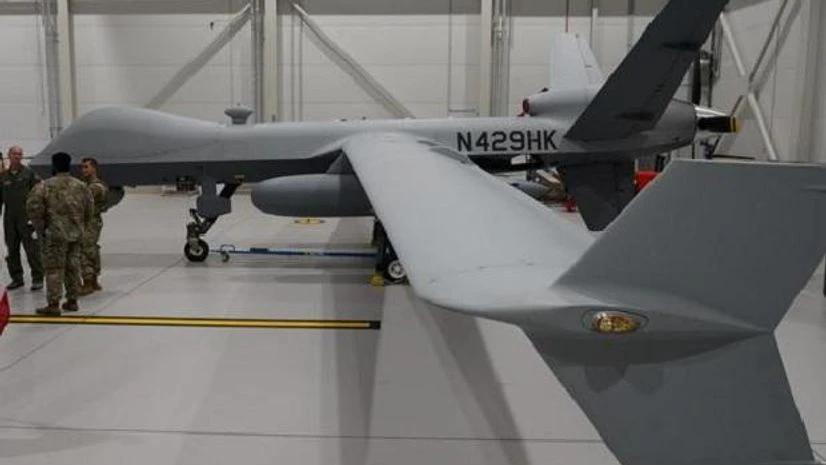India is in an "advanced stage" of negotiations with the US to procure 30 MQ-9B Predator armed drones for over USD 3 billion to crank up its surveillance apparatus along the frontier with China as well as in the Indian Ocean region, people familiar with the developments said on Sunday.
The MQ-9B drone is a variant of the MQ-9 "Reaper" which was used to launch a modified version of the Hellfire missile that eliminated al-Qaeda leader Ayman al-Zawahiri in the heart of Kabul last month.
Authoritative sources in the defence establishment said talks between New Delhi and Washington are underway for the government-to-government procurement of the General Atomics-built drones, and rejected reports that the deal is off the table.
Dr Vivek Lall, the Chief Executive for the General Atomics Global Corporation, told PTI that the acquisition programme is at an advanced stage of discussions between the two governments.
"We understand that the MQ-9B acquisition programme is at an advanced stage of discussion between the US and Indian governments," he said.
Also Read
"Any questions on those discussions should be addressed specifically to the respective governments. From a company perspective, General Atomics is ready to support India and values our longtime relationship," Lall added.
The hunter-killer drones are being procured for the three services as they can carry out a variety of roles, including maritime surveillance, anti-submarine warfare and over-the-horizon targeting.
The high-altitude long-endurance (HALE) drones are capable of remaining airborne for over 35 hours and can carry four Hellfire missiles and around 450 kgs of bombs.
The MQ-9B has two variants SkyGuardian and its sibling SeaGuardian.
The sources said the talks are focused on sorting out certain issues relating to cost, weapons package and technology sharing.
It is learnt that the procurement proposal figured in the fourth two-plus-two foreign and defence ministerial dialogue between India and the US in Washington in April.
In 2020, the Indian Navy had taken on lease two MQ-9B Sea Guardian drones from General Atomics for one year for surveillance in the Indian Ocean. The lease period has been extended subsequently.
The Indian Navy has been bolstering its surveillance mechanism to monitor growing Chinese activities including frequent forays by PLA warships in the Indian Ocean Region.
When asked about the two drones, Lall said they have performed "very well" and flew close to 3,000 hours in support of the Indian Navy's maritime and land border patrol objectives.
"General Atomics has supported India over the past three years by providing two MQ-9 remotely piloted aircraft as part of a Company Owned/Company Operated (COCO) lease agreement," he said.
"Over the past six months, close to 3,000 hours have been flown in support of the Indian Navy's maritime and land border patrol objectives, covering over 14 million square miles of operating area," he said.
"Our Indian customer has been impressed by the MQ-9's over-the-horizon ISR (intelligence, surveillance and reconnaissance) support for surface units and Indian warships, as well as the exceptional endurance and operational availability of the platform," the top executive added.
The MQ-9Bs are designed to not only meet the standards of NATO (North Atlantic Treaty Organization) but also to comply with civil airspace requirements in the US and around the world, according to General Atomics.
Indian armed forces have been focusing on procuring unmanned platforms, including armed drones, in the backdrop of the eastern Ladakh border standoff with China and for tracking movements of Chinese warships in the Indian Ocean region.
The procurement proposal has been moved by the Indian Navy and all three services are likely to get 10 drones each.
The drone is the first hunter-killer unmanned aerial vehicle (UAV) designed for long-endurance and high-altitude surveillance.
The MQ-9B has signals intelligence and communications intelligence systems integrated onboard, but it can take any number of other custom sensors as necessary.
In 2019, the US approved the sale of armed drones to India and even offered integrated air and missile defence systems.
The Indian Navy has been strongly pushing for the procurement to boost its overall surveillance over the Indian Ocean, a region that has witnessed increasing forays by Chinese ships and submarines in the last few years.
In February 2020, India sealed a USD 2.6 billion deal with the US for the procurement of 24 MH-60 Romeo helicopters from American aerospace major Lockheed Martin for the Indian Navy. The delivery of the helicopters has already begun.
Following the eastern Ladakh standoff, India has significantly enhanced its day and night surveillance over the Line of Actual Control (LAC) using a fleet of remotely piloted aircraft.
The Indo-US defence ties have been on an upswing in the last few years.
In June 2016, the US designated India a 'Major Defence Partner', paving way for sharing of critical military equipment and technology.
The two countries have also inked key defence and security pacts over the past few years, including the Logistics Exchange Memorandum of Agreement (LEMOA) in 2016 that allows their militaries to use each other's bases for repair and replenishment of supplies.
The two sides signed COMCASA (Communications Compatibility and Security Agreement) in 2018 which provides for interoperability between the two militaries and provides for the sale of high-end technology from the US to India.
In October 2020, India and the US sealed the BECA (Basic Exchange and Cooperation Agreement) agreement to further boost bilateral defence ties.
The pact provides for sharing high-end military technology, logistics and geospatial maps between the two countries.
(Only the headline and picture of this report may have been reworked by the Business Standard staff; the rest of the content is auto-generated from a syndicated feed.)

)
